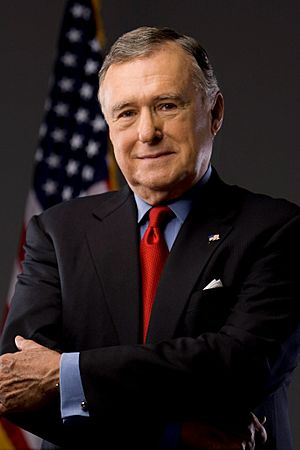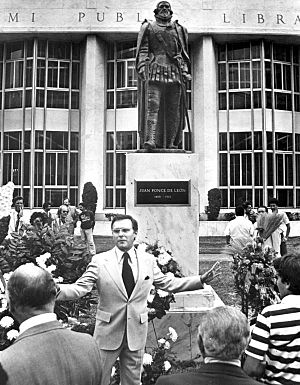Maurice Ferré facts for kids
Quick facts for kids
Maurice Antonio Ferré
|
|
|---|---|
 |
|
| 32nd and 34th Mayor of Miami | |
| In office November 8, 1973 – November 14, 1985 |
|
| Preceded by | David T. Kennedy |
| Succeeded by | Xavier Suárez |
| In office April 19, 1973 – August 17, 1973 |
|
| Preceded by | David T. Kennedy |
| Succeeded by | David T. Kennedy |
| Member of the Florida House of Representatives from the 91st District | |
| In office March 1967 – March 1968 |
|
| Preceded by | Dick Renick |
| Succeeded by | Dick Renick |
| Member of the Miami-Dade County Commission District 7 | |
| In office May 1, 1993 – January 3, 1997 |
|
| Preceded by | Constituency established |
| Succeeded by | Jimmy Morales |
| Personal details | |
| Born | June 23, 1935 Ponce, Puerto Rico |
| Died | September 19, 2019 (aged 84) Miami, Florida, U.S. |
| Political party | Democratic |
| Spouse | Mercedes Ferré |
| Residences | Miami, Florida |
| Alma mater | University of Miami |
| Occupation | Politician |
| Website | ferre2010.com |
Maurice Antonio Ferré (born June 23, 1935 – died September 19, 2019) was an American politician. He served six terms as the Mayor of Miami.
Maurice Ferré made history as the first mayor of a major U.S. city who was born in Puerto Rico. He was also the first Latino Mayor of Miami. Later in his career, he ran for a seat in the U.S. Senate for Florida in 2010, but he was not successful.
Contents
Early Life and Family Background

Maurice Ferré was born in Ponce, Puerto Rico. His father, José Ferré, was a businessman. Maurice was also the nephew of Luis A. Ferré, who served as the governor of Puerto Rico.
Maurice's father, José, visited Miami, Florida, in the 1920s. He noticed that the city did not have many tall buildings. This inspired him to start a career in construction and real estate in Miami. Maurice was born when his family returned to their hometown of Ponce. Maurice Ferré later graduated from the University of Miami.
Political Career and Public Service
Maurice Ferré began his public service in the Florida House of Representatives. He served there from 1967 to 1968.
He then became the mayor of Miami. He held this important position for many years, from 1973 to 1985.
Later, from 1993 to 1997, Ferré served on the Miami-Dade County Board of Commissioners. He also held the role of Vice-Chairman for the board.
Maurice Ferré was involved in national politics too. He was a member of several advisory groups for U.S. presidents. Besides his political work, he also worked as a banker and a business consultant. He held different research and teaching jobs as well.
In 1995, Maurice Ferré faced a personal tragedy. His son, daughter-in-law, and grandson died in a plane crash in Colombia.
Ferré ran for mayor of Miami-Dade County in 1996. He finished third in the election and did not make it to the final round. In 2001, he tried to be reelected as Mayor of Miami but was not successful. He ran for mayor of Miami-Dade County again in 2004, but he did not win enough votes to move forward.
Later Years and Legacy
In his later years, Maurice Ferré was a fellow at Princeton University. He spent time writing a book about the important contributions that Hispanic people have made to American culture.
Ferré was also a key person behind something called the "intermestic" dialogue. This idea aimed to find common ground on the political future of Puerto Rico. He spoke about this effort to the Puerto Rico Senate in 2006.
In October 2009, Ferré announced he was running for the open U.S. Senate seat in Florida. However, he finished in last place in the Democratic primary election.
Maurice Ferré is sometimes known as the "father of modern-day Miami." This nickname shows how much he helped shape the city. To honor his work, a park district in Miami, which used to be called Museum Park, was renamed after him in early 2019.
Maurice Ferré passed away in Miami on September 19, 2019. He was 84 years old and died from spinal cancer.
See also
 In Spanish: Maurice Ferré para niños
In Spanish: Maurice Ferré para niños
- List of Puerto Ricans
 | Claudette Colvin |
 | Myrlie Evers-Williams |
 | Alberta Odell Jones |

